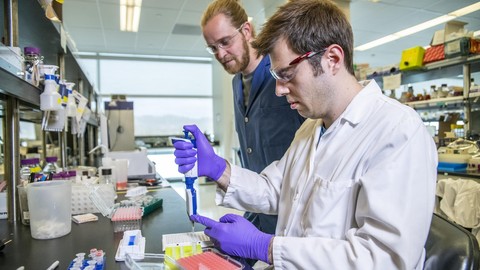
Downstream and Immobilized Enzyme MCQ (Bio Chemical)
-
Downstream Processing -
Immobilized Enzyme
- Anyone who wants to learn Bio Chemical
- Advanced Bio Chemical
- Downstream Processing
- Immobilized Enzyme
Downstream processing refers to the recovery and the purification of biosynthetic products, particularly pharmaceuticals, from natural sources such as animal or plant tissue or fermentation broth, including the recycling of salvageable components and the proper treatment and disposal of waste. It is an essential step in the manufacture of pharmaceuticals such as antibiotics, hormones (e.g. insulin and humans growth hormone), antibodies (e.g. infliximab and abciximab) and vaccines; antibodies and enzymes used in diagnostics; industrial enzymes; and natural fragrance and flavor compounds. Downstream processing is usually considered a specialized field in biochemical engineering, itself a specialization within chemical engineering, though many of the key technologies were developed by chemists and biologists for laboratory-scale separation of biological products
Downstream processing and analytical bioseparation both refer to the separation or purification of biological products, but at different scales of operation and for different purposes. Downstream processing implies manufacture of a purified product fit for a specific use, generally in marketable quantities, while analytical bioseparation refers to purification for the sole purpose of measuring a component or components of a mixture, and may deal with sample sizes as small as a single cell
An immobilized enzyme is an enzyme attached to an inert, insoluble material—such as calcium alginate (produced by reacting a mixture of sodium alginate solution and enzyme solution with calcium chloride). This can provide increased resistance to changes in conditions such as pH or temperature. It also lets enzymes be held in place throughout the reaction, following which they are easily separated from the products and may be used again – a far more efficient process and so is widely used in industry for enzyme catalysed reactions. An alternative to enzyme immobilization is whole cell immobilization
These questions will give you basic idea for Examination Preparation and/or interview on Downstream Processing and Immobilized Enzyme.
Please Note:
- These questions are only for practice and understanding level of knowledge only. It is not necessary that these questions may or may not appear for examinations and/or interview questions
- In this practice test, because of large amount of questions (around 55 questions) some of questions may have repeated
- I had to put as 70% pass rate because there may also be wrong answers from my side
- Bio Chemical
- Downstream Processing
- Immobilized Enzyme



